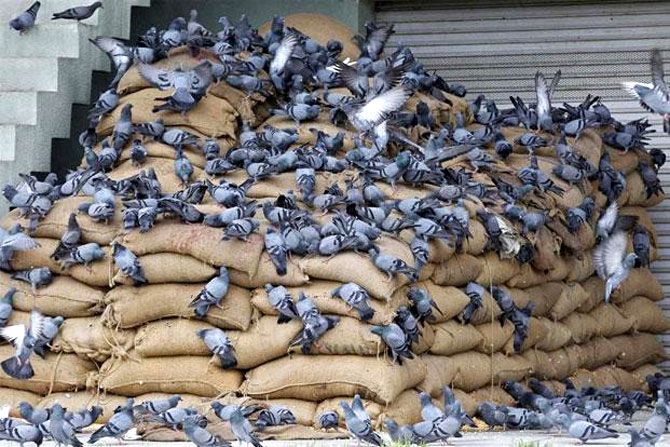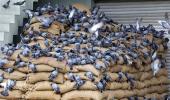'There is no foodgrain shortage in the country as our total storage capacity is more than 81 million tonnes, while the public distribution system requirement is 61 million tonnes.'
'I can protect the sugar industry but not give them the freedom to loot.'

Ram Vilas Paswan, bottom, left, is one of the most experienced ministers in the Narendra Modi government. As the government moves towards a regime of better-targeted subsidies, Paswan, as in-charge of food and consumer affairs, is playing a crucial role in reforming the decades-old public distribution system. In an interview with Sanjeeb Mukherjee, the eight-time Lok Sabha MP says he would ensure that no one in the country dies of starvation, no matter how severe the drought is. Excerpts:
Sugar industry players are saying the Centre acted in haste by putting stock limit when the market just began looking up. Do you think government intervention was needed?
I am not only the food minister of this country but also the consumer affairs minister. As food minister, I needed to protect the farmers. And for that mills needed to survive. Here, I want to thank the prime minister for accepting all our proposals to help the farmers, be it on raising the import duty, softening of loans, or export subsidy… everything possible was done.
That time also our intention was to mitigate the plight of the farmers and let their dues get cleared, which has happened. As a result, the mills survived and the ex-factory price of sugar rose from Rs 23-24 per kg to Rs 32-33. Till the ex-factory price was around Rs 34 per kg, it was fine with me.
But the retail price kept on rising and in some places it went up to Rs 42-43 per kg. There were firm indications that the price was going to go up further in the coming months. In such a scenario, we had to act. I can protect the sugar industry but not give them the freedom to loot.
As food minister, my job was to help the mills, which we did. And as consumer affairs minister, I could not allow a price increase beyond tolerable limits, which is why the government had to act.
If sugar prices don’t come down, will you take more harsh measures?
Prices will come down as we don’t have any shortage of sugar. It is just panic mongering which has pushed up prices. We might not need more interventions.
Do you think the volatility in sugar, seen in the past two years, will go away after the recent government interventions?
Definitely. But it must also be kept in mind that there are ups and down in any business. When you earn money, nobody is bothered. But questions are raised when you start losing money. Tell me, why was sugar de-controlled? Once it has been de-controlled, and everything is under the control of market, how is the government responsible for mills’ profit or loss?
Overall, I am not against sugar industry and don’t have any biased opinion against them, but if consumers suffer and mills make profits, questions would be raised on my competence.
 In the Maggi controversy, the case in the consumer court is dragging on while Maggi has got relief from most other places. Do you have any intention of withdrawing the petition?
In the Maggi controversy, the case in the consumer court is dragging on while Maggi has got relief from most other places. Do you have any intention of withdrawing the petition?
Ours is a case in the interest of Indian consumers and we have no intention of taking it back. We have forwarded the case to the consumer court. Now it is their responsibility to leave or indict Maggi. From our side, there will be no let up. If court says Maggi is clean, then it is clean. And if it does not, then Maggi has to pay the price.
The Supreme Court, in a recent judgement on the management drought and drinking water crisis, has castigated both the Centre and states for not being able to provide foodgrain as promised under the Food Security Act. Whom do you blame for this?
There are two angles to this. Earlier, foodgrain was distributed under Above Poverty Line (APL), Below Poverty Line (BPL), Antyodaya Anna Yojana (AAY) and other welfare schemes, including grains for Schedules Castes/Schedules Tribes hostels, jails, pregnant women, Midday Meal Scheme, etc.
Under that scheme, BPL families got 35 kilograms of rice or wheat at a higher rate. After the National Food Security Act (NFSA) was introduced, APL and BPL got subsumed, while AAY rate and its allocation remained.
Under NFSA, the number of beneficiaries rose from 320 million to over 720 million, while the price of grains was made uniform - Rs 3 per kg for rice, Rs 2 per kg for wheat and Rs 1 per kg for coarse cereals.
There is no foodgrain shortage in the country as our total storage capacity is more than 81 million tonnes, while the public distribution system (PDS) requirement is 61 million tonnes.
The second aspect is of subsidy. While 13 states are giving foodgrain subsidies on their own on, over and above what Centre gives, making foodgrain cheaper for consumers, other state governments, including Bihar and Uttar Pradesh (UP), don’t offer any extra subsidy.
In the event of drought or any other natural calamity, isn’t it the responsibility of the states to ensure that no one goes hungry? When the Centre is willing to provide all possible help, why aren’t some states coming forward? There is no dearth of funds with them.
If a state like UP wants to help drought-hit people, it should make some contribution from its own side as well. But there are some who just want to push all the responsibility on the Centre.
Are you suggesting that drought-hit states should have given a part of subsidy from their own account to avoid a situation of starvation?
Yes, they can do that. In fact, they should be doing that. Like in Bundelkhand, the UP government is running a Samajwadi Khadya Yojana. But can anyone tell how much of the financial burden for the scheme is being borne by the state government? The answer is none.
Centre gives Rs 29 per kg subsidy on rice and Rs 19 per kg subsidy on wheat. The rest is paid by the consumers of Bundelkhand. If the state really wants to help the poor, why doesn’t it waive off the Rs 2 per kg cost that the consumers have to bear, making it totally free?
Despite all these efforts, why do we keep hearing about starvation-related casualties?
The Centre’s role is to ensure that foodgrain reach Food Corporation of India (FCI) godowns. From FCI godowns, the state governments lift the grains at their own convenience. Every month, we have been recording 100 per cent lifting of the grains from FCI godowns. Not just this, we also give states the option to avail six months’ allocation in advance.
States like Punjab have taken grains in advance from the Centre. When Centre is willing to give grains in advance and there is 100 per cent lifting from FCI warehouses, why do people like Jaago Majhi in Bihar or Nathu Prasad in UP’s Banda die of hunger? Centre is not running away from its responsibilities but states also need to be answerable.
Has the UP government made any demand for extra foodgrain for Bundelkhand? It hasn’t. One thing I can assure you is that there will be no starvation-related death in this country because of Centre’s laxity.
Do you think starvation-related deaths could have been avoided in Bihar and UP if NFSA was implemented properly?
Our job is to fix a percentage. But it is states’ responsibility to identify the beneficiaries and reach out to them. If there has been any starvation-related death in a state where NFSA has been implemented, it means the state government is incompetent and entire onus lies on it.
If any poor person is left out of the list of beneficiaries, it is the responsibility of the state to include him or her. If grains are allocated by the Centre but do not reach the intended beneficiaries, then too states should be held accountable.
On sugar
Prices will come down as we don’t have any shortage of sugar. It is just panic mongering which has pushed up prices. We might not need more interventions...
As food minister, I help sugar mills; as consumer affairs minister, I keep prices low”
On Maggi
Ours is a case in the interest of Indian consumers and we have no intention of taking it (the case against Nestle) back… From our side, there will be no let up”
On starvation-related deaths
Centre gives Rs 29 per kg subsidy on rice and Rs 19 per kg subsidy on wheat. If the state (Uttar Pradesh) really wants to help the poor, why doesn’t it waive off the Rs 2 per kg cost that the consumers have to bear, making it totally free?













 © 2025
© 2025